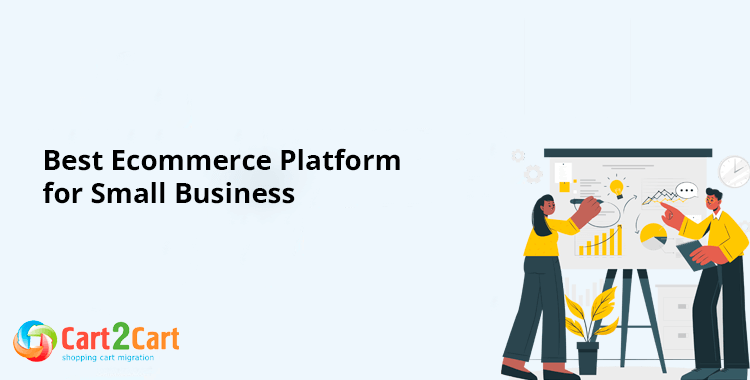 In today's digital age, establishing an online presence is essential for small businesses aiming to reach a broader audience and increase sales. The rise of e-commerce has opened doors for entrepreneurs, allowing them to sell products and services to customers worldwide. However, choosing the right e-commerce platform can significantly impact a business's success. In this article, we'll explore the best e-commerce platform for small business, highlighting their features, benefits, and how to select the one that best fits your needs.
In today's digital age, establishing an online presence is essential for small businesses aiming to reach a broader audience and increase sales. The rise of e-commerce has opened doors for entrepreneurs, allowing them to sell products and services to customers worldwide. However, choosing the right e-commerce platform can significantly impact a business's success. In this article, we'll explore the best e-commerce platform for small business, highlighting their features, benefits, and how to select the one that best fits your needs.
Why Is Choosing the Right Ecommerce Platform Important?
The right e-commerce platform can streamline operations, enhance customer experience, and drive sales. Here are several reasons why this decision is crucial:- User Experience: A good platform provides an intuitive interface for both you and your customers, ensuring easy navigation and transactions. The easier it is for customers to shop, the more likely they are to make a purchase.
- Cost-Effectiveness: With various pricing plans, selecting the most cost-effective option is crucial for small businesses with limited budgets. Understanding your budget will help you choose a platform that fits your financial constraints while still offering necessary features.
- Scalability: As your business grows, your e-commerce platform should scale with it. This means accommodating more products, higher traffic, and advanced features without needing a complete overhaul. The ability to scale is essential for long-term success.
- Integration Options: The ability to integrate with other tools (like payment processors, marketing software, and inventory management systems) can simplify operations and enhance productivity. Integration with existing systems can save time and reduce errors.
- Support and Resources: Reliable customer support and educational resources can help you navigate challenges and optimize your online store. A strong support system is particularly valuable for small business owners who may not have a dedicated IT department.

Key Considerations When Choosing an Ecommerce Platform
Before diving into specific platforms, let’s discuss some essential considerations that can guide your decision-making process:1. Business Type and Goals
Understanding the nature of your business and your specific goals will greatly influence your choice. Are you selling physical products, digital goods, or services? Each type of business has unique needs that various platforms cater to differently. For instance, if you plan to sell subscription services, look for platforms that support recurring billing.2. Product Range
Consider the number and variety of products you plan to sell. Some platforms are better equipped to handle extensive product catalogs, while others may be more suitable for smaller inventories. If you anticipate adding a significant number of products in the future, choose a platform that can handle this growth.3. Customer Support Needs
As a small business owner, you may require more support than a larger enterprise. Research the level of customer service each platform offers. Some provide 24/7 support, while others may have limited availability. Consider platforms that offer live chat, phone support, and extensive documentation.4. Marketing and SEO Features
A successful e-commerce business requires effective marketing strategies. Look for platforms that offer built-in SEO tools, marketing integrations, and social media capabilities. A platform with strong marketing features can help drive traffic to your store and improve conversion rates.5. Mobile Responsiveness
With the increasing prevalence of mobile shopping, ensure that the platform you choose offers mobile-friendly templates and functionalities. A mobile-responsive design is crucial for providing an optimal shopping experience on smartphones and tablets.Top Features to Look for in an Ecommerce Platform
When evaluating the best e-commerce platform for small business, consider these essential features:- Ease of Use: A user-friendly interface allows you to set up and manage your online store without needing extensive technical knowledge. The learning curve should be minimal so that you can focus on running your business.
- Customization Options: The ability to customize your store's appearance and functionalities allows you to align it with your brand identity. Choose a platform that offers flexible design options, so your store can stand out from the competition.
- Payment Processing: Look for platforms that support various payment options, including credit cards, PayPal, and alternative payment methods. A diverse range of payment options can enhance the shopping experience for your customers.
- SEO Capabilities: A platform that offers SEO tools helps your store rank higher in search engine results, increasing visibility and attracting potential customers. Ensure the platform allows you to customize URLs, titles, and meta descriptions easily.
- Inventory Management: Efficient inventory management is crucial for e-commerce businesses. Choose a platform that provides tools for tracking inventory levels, managing stock, and notifying you of low stock situations.
- Analytics and Reporting: Understanding your business performance is vital for making informed decisions. Look for platforms that provide detailed analytics and reporting features to track sales, customer behavior, and inventory performance.

Comparing the Best Ecommerce Platforms for Small Business
To help you make an informed decision, we’ve compared some of the top e-commerce platforms tailored for small businesses. The following table summarizes the key features, pricing, and user experiences of each option:| Platform | Key Features | Pricing | Best For |
| Shopify | User-friendly, extensive app marketplace, 24/7 support | Starts at $29/month | All-in-one solution |
| WooCommerce | Highly customizable, WordPress integration, SEO-friendly | Free (plus hosting costs) | Existing WordPress users |
| BigCommerce | No transaction fees, built-in SEO tools, multi-channel selling | Starts at $29.95/month | Growth-oriented businesses |
| Wix | Drag-and-drop builder, customizable templates | Starts at $23/month | Beginners and creatives |
| Squarespace | Beautiful templates, strong blogging capabilities | Starts at $18/month | Visual brands |
1. Shopify: The All-in-One E-Commerce Solution
Shopify is one of the most popular e-commerce platforms, known for its user-friendly interface and extensive features. It's an all-in-one solution that allows you to create and manage your online store seamlessly.Key Features:
- Ease of Use: Shopify's intuitive dashboard makes it easy to manage products, orders, and customers without extensive technical knowledge.
- App Marketplace: With hundreds of apps available, you can extend your store's functionality to meet your specific needs, whether it’s for marketing, customer service, or inventory management.
- 24/7 Support: Shopify offers round-the-clock support through various channels, ensuring you get help whenever you need it. This is particularly useful for small business owners who may face challenges during off-hours.
- Payment Options: Shopify supports multiple payment gateways, allowing customers to pay in various ways, enhancing their shopping experience.
Pricing:
Shopify's pricing starts at $29 per month, making it accessible for small businesses. As your business grows, you can upgrade to higher plans for advanced features. Shopify also charges transaction fees unless you use Shopify Payments, which can add to your overall costs.2. WooCommerce: The Customizable Powerhouse
If you already have a WordPress website, WooCommerce is an excellent option for adding e-commerce functionality. It’s a plugin that allows you to transform your site into a fully functional online store.Key Features:
- Customization: WooCommerce is highly customizable, allowing you to modify almost every aspect of your store to fit your brand's identity and needs.
- SEO-Friendly: Being a WordPress plugin, it benefits from strong SEO capabilities, helping your store rank better in search results and attracting organic traffic.
- Community Support: A vast community of developers and users means you can find numerous resources and plugins, making it easier to troubleshoot issues or enhance your store's functionality.
- Flexible Payment Options: WooCommerce supports various payment gateways, giving you flexibility in how you process transactions.
Pricing:
WooCommerce is free, but you’ll need to pay for web hosting and any premium plugins or themes you choose to use. This can lead to variable costs depending on the choices you make for your site.3. BigCommerce: Ideal for Growth
BigCommerce is another powerful platform designed for businesses that expect to grow rapidly. It offers a range of built-in features, allowing you to scale without relying on third-party apps.Key Features:
- No Transaction Fees: Unlike some competitors, BigCommerce does not charge transaction fees, making it cost-effective for high-volume sales. This can lead to significant savings as your sales increase.
- Multi-Channel Selling: You can sell on various platforms, including Amazon, eBay, and social media, directly from your BigCommerce store, expanding your reach and customer base.
- SEO Tools: Built-in SEO tools help optimize your store for search engines, which can significantly improve visibility and drive traffic.
- Robust Analytics: BigCommerce provides comprehensive analytics, allowing you to track sales, customer behavior, and inventory performance effectively.
Pricing:
BigCommerce starts at $29.95 per month, offering various plans that cater to different business needs. As your sales grow, you may need to upgrade to higher plans, which offer more advanced features.4. Wix: The Creative Builder
Wix is a website builder that also offers e-commerce capabilities. It's perfect for small businesses that prioritize design and creativity.Key Features:
- Drag-and-Drop Interface: Wix’s intuitive builder makes it easy to create a visually appealing store without any coding skills. This feature is especially beneficial for those who want a unique and tailored look for their store.
- Customizable Templates: Choose from hundreds of stunning templates tailored for online stores, ensuring that your site reflects your brand's personality.
- Integrated Marketing Tools: Wix provides built-in tools for email marketing and social media integration, allowing you to promote your products effectively.
- App Market: Wix's App Market includes various tools to enhance your store’s functionality, including options for inventory management, analytics, and customer support.
Pricing:
Wix’s e-commerce plans start at $23 per month. It offers a range of pricing options, making it accessible for various budgets.5. Squarespace: The Visual Brand Builder
Squarespace is known for its beautiful templates and design capabilities, making it an excellent choice for visual brands looking to showcase their products.Key Features:
- Stunning Templates: Squarespace offers a range of professionally designed templates that are highly customizable, allowing you to create a visually striking online store.
- Integrated Blogging: If content marketing is part of your strategy, Squarespace’s blogging capabilities allow you to share updates, stories, and product launches easily.
- Mobile Optimization: All Squarespace templates are mobile-optimized, ensuring a seamless shopping experience for users on all devices.
- Built-in SEO Tools: Squarespace provides tools to optimize your site for search engines, helping improve your online visibility.
Pricing:
Squarespace pricing starts at $18 per month for the basic e-commerce plan, making it a viable option for small businesses that want a visually appealing site.Conclusion
Choosing the best e-commerce platform for small business depends on your specific needs, goals, and budget. Each platform has its strengths and weaknesses, making it crucial to assess which one aligns best with your business strategy.- Shopify is an excellent all-in-one solution for those who want a user-friendly experience and extensive features.
- WooCommerce is perfect for existing WordPress users looking for customization and flexibility.
- BigCommerce caters to growth-oriented businesses that need a robust platform without transaction fees.
- Wix offers an intuitive builder for those prioritizing design and creativity.
- Squarespace is ideal for visually-focused brands that want to showcase their products beautifully.






